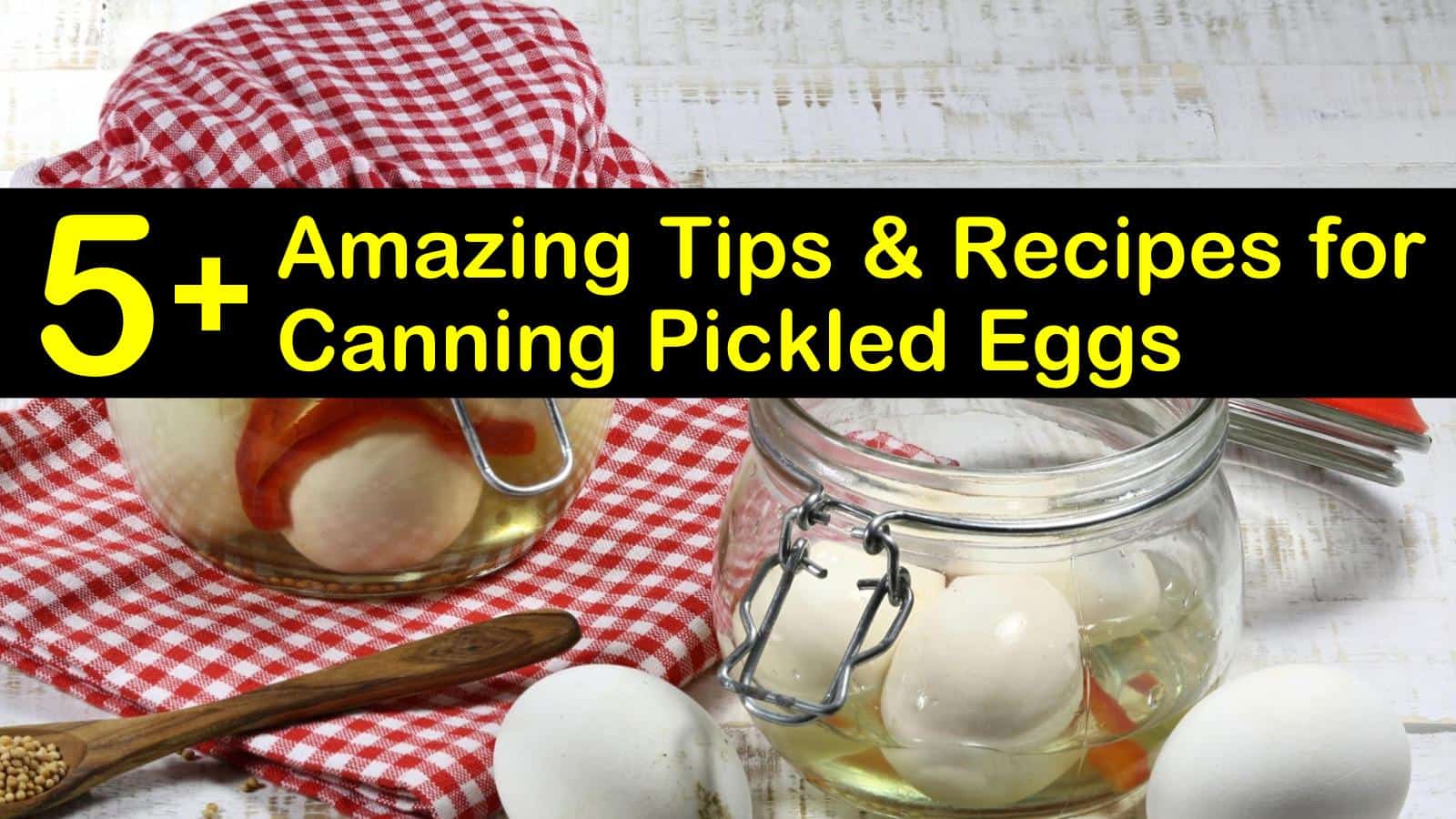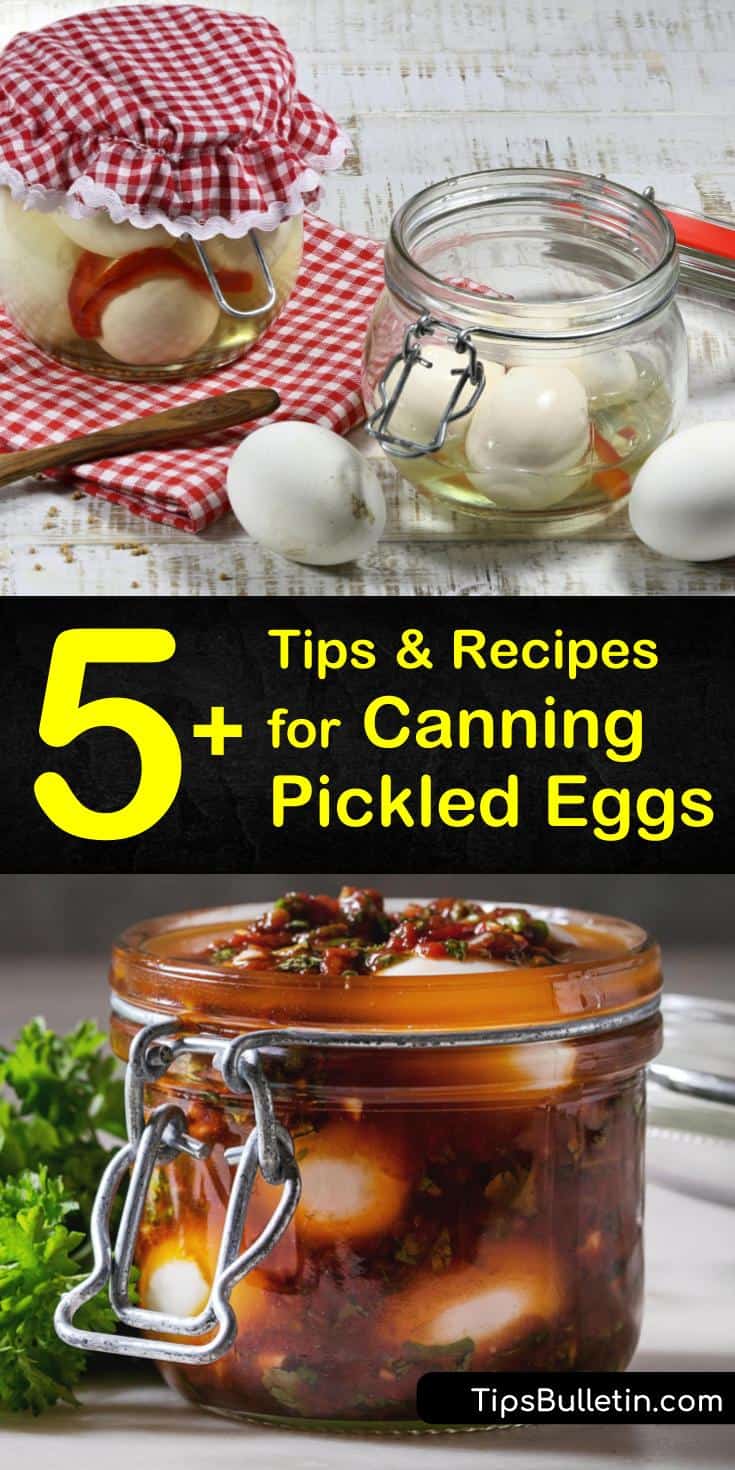Eggs are a great source of energy and account for the critical ingredient in yummy appetizers like deviled eggs and egg salad. Yet as packed with nutrients as these delectable treats may be, their shelf-life is not always conducive to how fast we eat them. One excellent way to increase the longevity of these foods is by canning pickled eggs.
Pickled eggs come in a wide variety of flavors, ranging from sweet to spicy and everything in between. Without canning, pickled eggs last about two to three months, over two months longer than they usually do in the fridge. Yet, after canning eggs, they last anywhere from six months to a year, increasing that number exponentially.
So, how to can pickled eggs correctly, and is it necessary to can fresh eggs? On their own, canning eggs without being hard-boiled and pickled first opens them up to potential bacteria issues like botulism. Taking extra steps before canning is the safest way to preserve eggs long-term, while also enveloping them in mouthwatering flavors you’ll love.

Delicious Recipes and Tricks to Can Pickled Eggs
How long do eggs last before you have to throw them out? It all depends on how you store them. Eggs last for a while in the refrigerator but you may want to keep them even longer.
You may ask, “Can I freeze eggs to make them last? Yes, you can freeze them, but many people enjoy the tangy tartness of dill pickles, the sweet notes of pineapple, or the hot and spicy flavor of jalapenos. This is why pickling eggs is such a great idea.
There’s an egg pickling recipe for everyone on this list. Can’t choose just one? Not a problem. Try a couple of different variations until you find your favorite.
Hard Boil the Eggs Before Pickling
No matter which pickle recipe you plan to use, storing fresh eggs the safest way requires cooking them first. It’s easy to hard-boil the eggs to limit the potential for accumulating botulism in the jar when canning. Because eggs are among the food groups at high risk for developing botulism, it’s essential to store hard boiled eggs properly to prevent sickness after eating.
If you don’t intend on canning the eggs after pickling, then at least refrigerate them when finished. The National Center for Food Preservation states that you should never store eggs at room temperature, as this is another way to increase the risk of bacteria.

Place all of the eggs you plan on using in a large pot with just enough water to cover them. If boiling six eggs or less, leave a one-inch layer of water over the top. If cooking anywhere from seven to a dozen eggs, then increase the thickness to two inches.
After that, add a teaspoon of vinegar and sprinkle in a half teaspoon of salt. Add heat and bring the water in the pot to a rolling boil for approximately one minute.
Remove the saucepan of eggs from the heat and allow it to sit for another ten minutes while it cools. After the ten minutes has expired, test one of the eggs to ensure it’s cooked all the way.
How to Can Pickled Eggs
Once the hard-boiling process is complete, the next step is to find a pickling solution that works for you. If you aren’t into anything fancy or don’t want to alter the taste of your eggs too much, then using a basic brine solution when pickling works best.
Before adding your eggs to any pickling recipe, peel them first. This simple recipe requires one large Mason jar, or at least two separate quart jars, to fit all the eggs.
To make the brine, mix all of the ingredients, except for the eggs, in a large saucepan. Bring the pickling ingredients to a boil, then lower the heat and leave them to simmer for an additional five minutes.
After the brine has cooled, place the eggs into the jars and cover them with the mixture. If using multiple containers, evenly distribute the amount of pickling juice in each one.
Canning Eggs in Sweet Pickle Juice
If you prefer a sweet flavor, then this recipe for pineapple pickle eggs is a treat for your taste buds. After you boil and peel the eggs, do the same thing for the onions. The recipe below makes about one-quart jar’s worth and requires about five or six eggs.
Start by mixing the juice, vinegar, and spices in a large saucepan. Leave out the sugar and onions. Bring the sweet-flavored ingredients to a boil, then add the sugar.
Boil this mixture and stir until the sugar dissolves, then mix in the onions. If you are using pineapple juice that is already sweetened, however, don’t add sugar.
Dill Pickle Flavored Eggs Recipe
The most easily recognized flavor when it comes to pickles is dill. Just the mention of this tart taste is enough to pucker the cheeks.
That same delicious flavor also exists when pickling eggs, and is as easy as following the steps below. This process only takes about five minutes of prep time and 35 minutes total to make.
Mix the ingredients in a large pot, excluding the eggs, dill weed, and garlic. Place the eggs inside a glass jar, or two, while they wait for the brine and distribute the garlic and dill evenly between the jars.
Bring the contents in the saucepan to a boil, then let it simmer for another five minutes before removing it from the heat. Pour the mixture into the canning jars, leaving about one-half an inch of headspace from the top. Seal the container, and it’s ready for canning.
You can use a similar recipe when canning pickled banana peppers, carrots, cauliflower, or almost any vegetable you choose. Pickling spices and vinegar add some unexpected and delightful zip to canned foods.
Canning Pickled Eggs with Beets
Another unusual combination that is often seen with pickling and canning eggs is adding beets to the equation. Though the bright reddish-purple color brings its own allure to the recipe, the most significant selling point is the taste. If you can’t choose between something sour, something sweet, or something salty, you don’t have to with this fantastic recipe.
Start by portioning out the eggs, beets, and onions into either one large Mason jar or several smaller ones. When using canned beets, save the juice for cooking later.
Add the vinegar, beet juice, sugar, and remaining ingredients to a large pot, then bring them to a boil. After boiling, reduce the heat, then allow them to simmer for five minutes before pouring them into the jar.
Use a Spicy Pickling Recipe Before Canning
If your recipes need that extra special kick, then this jalapeno and pickled eggs combo will win your heart. Not only is it spicy, but it’s also absolutely delicious, and includes flavorful ingredients like green chilies and even your favorite hot sauce blend. This recipe uses three to four different quart jars to fit all the eggs adequately.
Begin by chopping the medium onions and crushing the garlic cloves. Divide the eggs into the quart jars, then combine the other ingredients in a saucepan, just like the other recipes.
This time, however, boil the mixture for ten to 15 minutes. Pour the brine solution into the jars evenly and seal the jars tightly.
Pressure Canning Pickled Eggs
When using the home canning process to preserve eggs, the most crucial step to start with is using flawless eggs. To prevent botulism from entering and developing inside the egg, double-check that the exterior is entirely unmarred.
There should not be any splits, cracks, or cuts in the egg at all before preparing. Also, if you used cold water or ice to peel them, then heat the eggs back up before canning.
Once you’re ready to begin canning, use the water bath canner method for preserving eggs. Start by filling the jars with the eggs and the brine you’ve chosen, leaving as little space between the juice and the top as you can.
Twist on the lid, then place in the hot water bath. Leave at least two inches of water above the containers. For pressure canning pickled eggs, bring the water in the pot to a boil, then let it continue to cook for an additional 15 minutes.
Remove the jars from the water using tongs to keep from burning your hands, then let them cool completely on towels on the kitchen counter or table. Store them in a dark, cool place, typically around 50 to 60°.
By now, you have several new options to choose from when it comes to pickling and canning eggs. While the process for how to can pickled eggs remains the same, the possibilities are endless when it comes to the pickling recipe beforehand.
If you’re still unsure about which one sounds best, just think about how you intend to use the eggs once you open them.

If you enjoyed these delicious canning recipes, then please remember to share everything you’ve learned about canning pickled eggs with friends and family on Facebook and Pinterest.